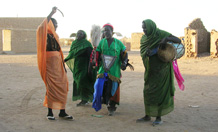
Photo taken by Dr Bergh during his fieldwork on music and conflict resolution in Sudan
Music conflict and transformation
The role of music in conflict and post conflict scenarios in places such as Sarajevo or Sierra Leone will be explored at a sociology conference on the 9th and 10th May.
Academics and practitioners working in the field of conflict transformation and the arts will investigate conflict situations in which music plays a dynamic role.
The outreach seminar series is being organised by the University of Exeter Sociology of the Arts Research Group (SocArts) which is devoted to exploring the dynamic role of music in human social life. Dr Arild Bergh, PhD (Exon), is organising the conference to encourage a more formal look at his field of research across different academic disciplines.
PhD students at Exeter Craig Robertson and Pinar Güran will present papers at the conference, based on fieldwork that research the use of music to resolve a dispute in a multicultural choir in Sarajevo and the use of music to reduce incidents of violence among young people in Berlin. Robertson's research shows that making music together is a way of transcending differences by framing old issues in new ways. This musical process also serves as a medium for building connections between people grounded in musical practice and musical achievements. According to this, music is a way of regaining a sense of normality by being creative together.
Dr Bergh’s PhD research focused on 5,000 internally-displaced people in a settlement in eastern Sudan. This group represented 29 different ethnic groups who forged a new joint identity through spontaneous and regular music performances over a 10 year period.
Dr Bergh said ‘As a result they not only reduced internal and external violence, they were also able to work together to improve their situation and through their music became so well known locally that the local authorities eventually gave them ownership of the land they had been squatting on.’
This is the largest academic conference ever to explore music and conflict in an international context. The event will bring together 43 experts from 11 countries working in sociology, psychology, law, development work, ethnomusicology, critical musicology, mediation and music. Overall, the aim of the symposium is to encourage the development of a theoretical foundation for music’s role in conflict scenarios and to formalise a worldwide network for scholars and activists in the area.
Dr Bergh added, ‘The increased interest in the use of music to bring people together in the aftermath of conflicts and to prevent new conflicts from occurring has shown that music has a lot of potential. However, due to the emerging nature of this field, there is little in-depth understanding of how music works and most use is based on theories. Hence, there is need for academic research to provide feedback and to work with practitioners to develop a framework.’
The Postdoc/PhD student journal Music and Arts in Action (MAiA ) edited by Arild and two other recent SocArts PhD students have written a special issue on Music and Conflict Resolution and includes an article by Craig Robertson.
Date: 8 May 2011
